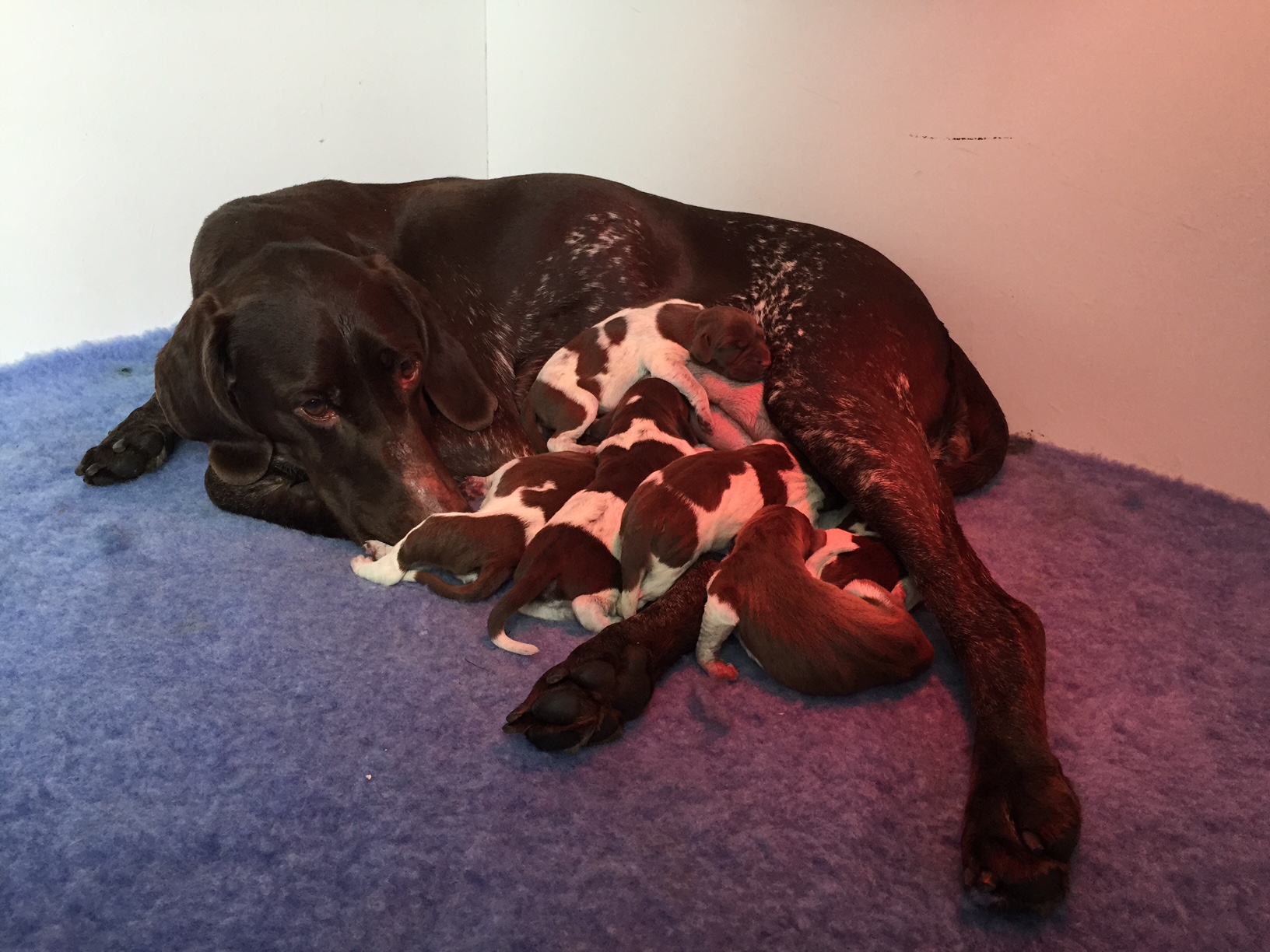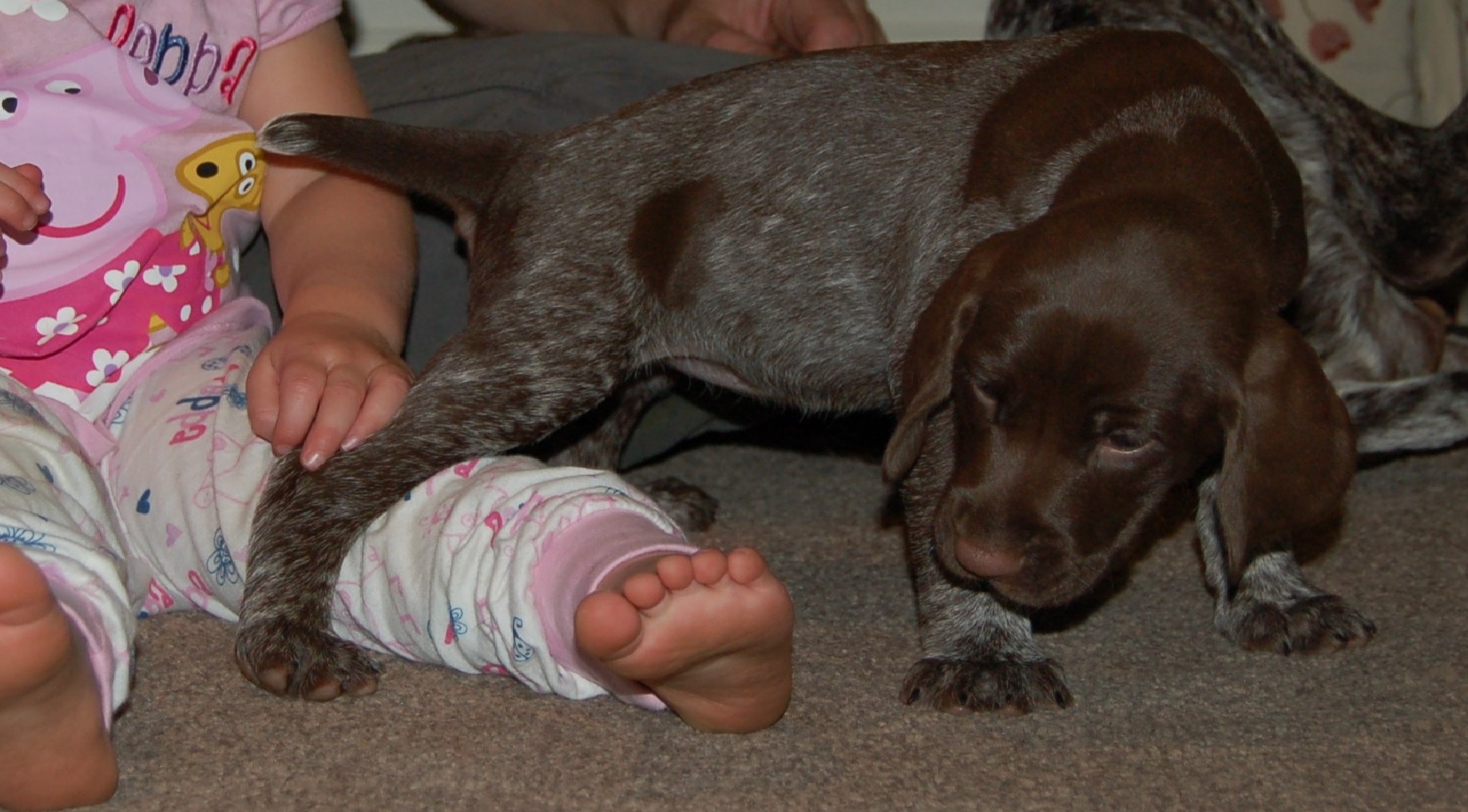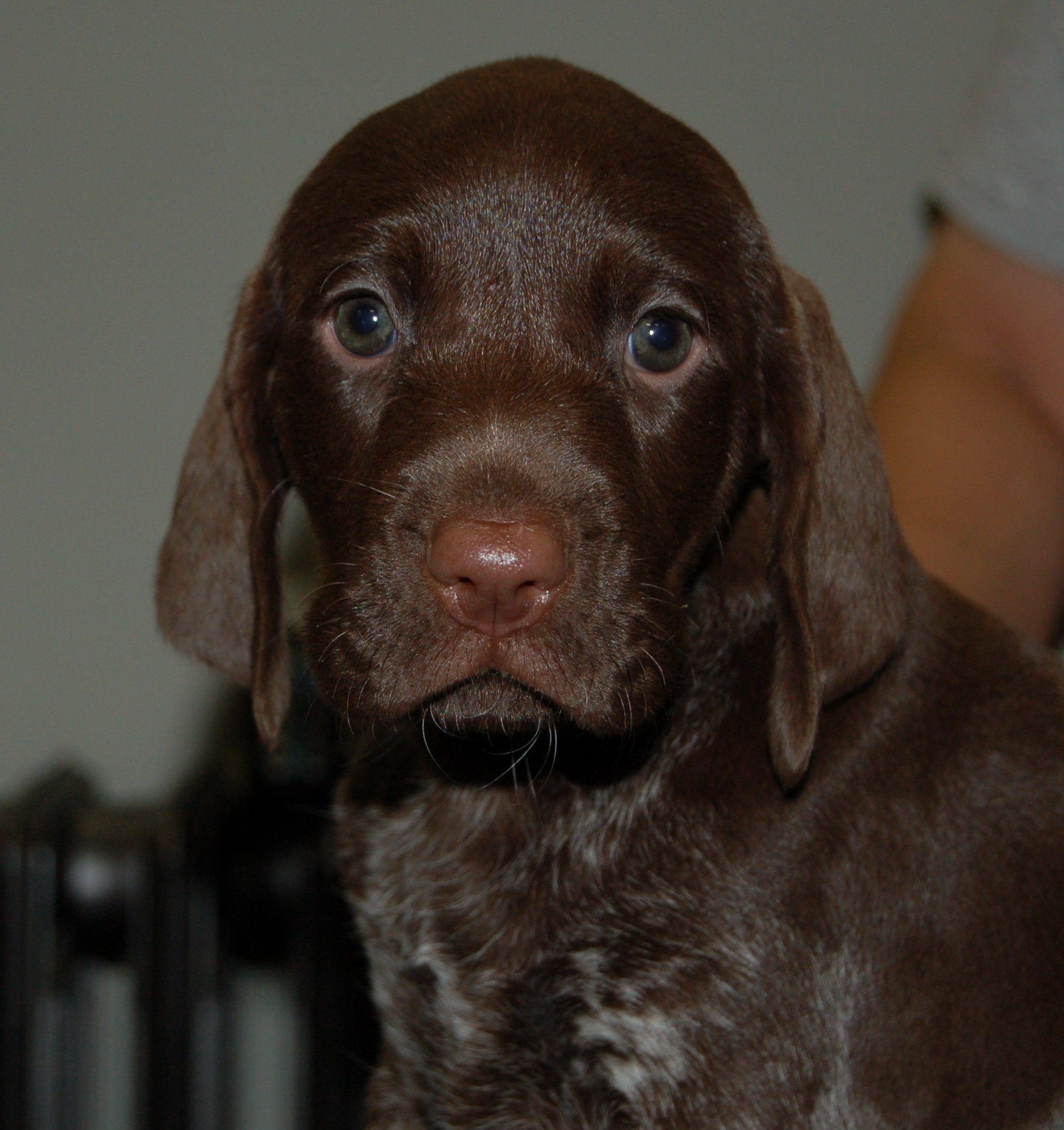Charlotte Tudor Discusses Dog Breeding of German Shorthaired Pointers
24/08/2015
In our last article, we talked to Charlotte Tudor about the work involved in showing dogs to Championship standards. It turned out to be one of our most popular articles so far this year, so it’s just as well that Charlotte had already been kind enough to talk to us again… but this time about her breeding of German Shorthaired Pointers.
Hi Charlotte, thanks for talking to us again. We know from a previous interview that you have two German Shorthaired Pointers and one Miniature Schnauzer. Could you tell us a little about which of your dogs you breed from? What appeals to you about this particular breed?
The three dogs I own now have all been born here at home. Parsley is the only dog I breed from just now – we have just said goodbye to her 2nd and last litter of puppies – she is nearly seven years old. Pepper, my other GSP, is only 2 years old. If the results of her health tests are positive then she will (hopefully) have a litter too, when she is a little older. GSP’s are a very special breed; loving, loyal, bold, intelligent, handsome and so versatile. They are first and foremost our family pets. I have two small children and the dogs are excellent with them, you already know that I show them and in the winter months they also work to the gun.
How did you get into dog breeding? And what are your reasons for doing it?
We bought our first GSP, Briar, in 1999 from a reputable and very successful breeder in Derbyshire. We took her to some gundog training classes and it was suggested that we show her! We started winning…a lot, and people started to inquire about puppies from her. After a lot of discussion and the support of a very experienced breeder who agreed to mentor us, we decided that we would like to start our own line and so the Torranpoints were born! We breed when we want to have a puppy and we also work on the basis that puppies resulting from our breeding should be an asset to the development of the breed as a whole.
Gilbertson & Page understand how important diet is in the critical time of breeding and a puppy’s early life. Consequently, they manufacture speciality dog foods especially for breeding mums and puppies. We already heard that you like to give your show dogs a salmon supplement for a glossy coat. Are there any supplements you favour during the gestation period? How important would you say diet is for breeding bitches and the puppies too?
We don’t give our bitches any additional supplements during their gestation period – they get all they need from their food. Diet is vital to the health of the bitch and her pups throughout gestation, whelping and lactation.
The delivery of the puppies must be quite stressful. What measures do you take to ensure as safe a delivery as possible?
Safe delivery of the puppies and care of the whelping bitch is extremely stressful and I’m always thankful when it’s all over! The main thing is to stay calm. We make sure that we have everything to hand – the whelping box is in situ with plenty of clean towels and newspapers and disinfectant to keep the area as clean as possible. The whelping kit is ready, as is clean bedding and a heat lamp for after the birth. I always make sure the car has plenty of diesel and that I have the vets number to hand, just in case. We start to take the bitch’s temperature about a week before her due date – a drop in body temperature lets us know that labour is imminent.
Naturally you want to find good homes and responsible owners for your puppies. How do you go about that?
We generally have a waiting list for our puppies. Prospective new owners on the waiting list are interviewed for their suitability to own one of our puppies. We would then invite the prospective new owners to come and meet us and our dogs at our home. It’s important to us to know about the family that will be taking one of our dogs into their home and what they intend to do with the puppy, i.e. show, work, agility, obedience etc. We offer lifetime support for the care of the puppy and we remain responsible if the puppy/dog needs to come back to us at any point during its life.
Do you have any tips for prospective dog owners to help them find a good dog breeder?
Finding a puppy and the right breeder is a time consuming job. Always go to the breeder’s home to collect your puppy and make sure you see it with its siblings and mother. Never buy a puppy from anyone who arranges to meet you in a car park or service station, even if it seems they are trying to save you some travelling time – chances are this is a puppy farmer. Often reputable breeders that have well bred, healthy puppies will have waiting lists so be prepared to be put on a waiting list. Expect to be grilled by the breeder about your lifestyle, home, working and leisure activities. Look for a breeder that has health tested the parents; this may be hip and elbow scoring, eye and heart testing. Breed clubs and the Kennel Club hold information on relevant health testing for your chosen breed and may also be able to let you know of any litters. Meet the mum of the pups and any other dogs the breeder may have so you can see the temperament of the dogs in their home and what your puppy will be like when (s)he grows up – they are not little for very long!
Expect to sign a contract when the puppy is sold, this will cover a variety of things such as information on your breeder’s willingness to give you a lifetime of help and advice; what to do if the puppy ever needs to be re-homed; and information on any endorsements on your puppy’s Kennel Club registration. (These are placed by the breeder to protect the puppy, generally 1. Progeny not eligible for registration and 2. Not eligible for issue of export pedigree). If your puppy is Kennel Club registered you should be given a registration document when you collect your puppy (and not before) and (usually) a five generation pedigree. Beware of breeders that offer alternative registrations – the Kennel Club certificate is the only one that assures you of generations of documented parentage. Also, remember that a puppy should never be an impulse buy. The puppy will live with you as part of your family for many years to come and you need to take due care to find a puppy who is fit, happy, healthy and will give you years of fun and companionship.
Do you keep in touch with the puppies’ new owners once they have gone to their new homes? Do puppies recognise their brothers and sisters when they are reunited?
We love to keep in touch with the puppies’ new owners. It’s great to know how they are getting on and what they are doing and we are always available to offer advice on any aspect of their dog’s well-being should they require it. We have become really good friends with some of our puppy owners and meet up regularly. I’m not sure if puppies recognise their siblings when they meet up – it’s difficult to know if they feel different about one of their brothers or sisters to any other dog they may meet. I think they definitely recognise me though!!
Once again, many thanks Charlotte, for sharing your thoughts and dogs with us.





